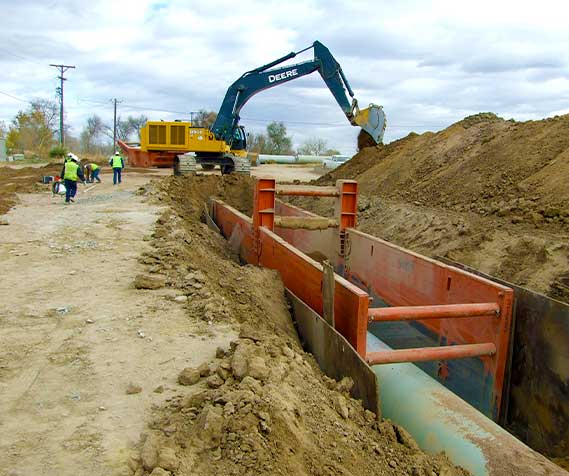It’s no secret that trenches are an integral part of any construction project. Whether you’re installing a new foundation, working on a sewer line, or building an underground parking garage, trenches are an essential tool for completing the job.
But as we all know, trenches are dangerous places—namely due to the risk of cave-ins and collapses. Dirt is unsteady and unstable and can cause preventable fatalities. So what can be done to protect your workers and prevent disasters from occurring?
Read on to learn more about the role that trench supplies play in preventing cave-ins, keeping your job site safe and compliant, and stopping costly mistakes before they happen.
Trench Safety with Supplies
The primary goal of trench supplies is to protect workers from collapses and cave-ins. To do this, three main methods are used: sloping, shielding, and shoring.
Sloping is when the walls of the trench are cut at an angle so that they will resist lateral pressure from soil buildup. Shielding involves placing a protective cage around the employees and equipment to protect them from cave-ins. Shoring is positively loading the soil surrounding the excavation to prevent soil movement. Movement could affect surrounding structures, such as roads and building foundations.
All three methods work together to ensure that your workers stay safe while digging in a trench and there is no negative impact on surrounding infrastructure.
The Role of Trench Boxes; an Integral Piece of Trench Safety Equipment
Trench boxes are an important tool for preventing cave-ins and collapses during excavation work. These small to large metal frames insert into your excavation and act as a brace against collapsing soil or debris.
Trench boxes also help to prevent worker injuries by creating a “safe zone” within the box that protects them from falling objects or shifting soil outside it. When you invest in quality trench boxes, you’re investing in your workers’ safety.
Well-made trench shoring equipment is worth the investment. Not only does it protect your employees and allow them to return safely to their families after work, but it also can increase productivity. A well-made shoring system has the power to increase the longevity of your investment — giving you a greater ROI.
Other Trench Safety Equipment
Finally, there are various tools used for preventing soil movement and cave-in during excavation projects. These include:
- Sheet piling (which consists of vertical sheets driven into the ground)
- Anchors (which attach sections of sheet piling together)
- Wales (which divert water away from a trench)
- Struts (which provide resistance against lateral pressure)
- Deadmen (which keep sections of sheet piling secure)
- Pins or nails (which allow pieces of sheet piling to be joined together)
- Tiebacks (which anchor sheet piles into solid earth)
All tools and equipment should be inspected continuously by an assigned and competent person. There are many factors that can affect safety that must be taken into consideration.
These may include but are not limited to: weather, vibrations near the trench, load surcharge from equipment and car traffic, overhead obstructions such as high voltage power lines, employee competent safety training, communication, and clear lines of responsibility on-site.
Kundel Industries, for Contractors by Contractors
If you’re looking for the gold standard in trench boxes, then look no further than Kundel Industries. As a company made by contractors, for contractors, we know exactly what you need out of a trench box to keep your workers safe.
And not only that, Kundel Industries holds 30 years of boots-on-the-ground experience in the construction business. You can trust that our trench boxes have been crafted with expertise and knowledge. We know what’s on the line when it comes to trench safety.
Keep Your Team Safe with Quality Trench Supplies
Trenches can be extremely dangerous worksites if not properly secured. However, with proper knowledge and preparation, you can keep your team safe from collapses or cave-ins.
Call your Kundel representative to discuss factors that may affect safety and efficiency. These can be job site conditions (soil and depths), equipment on site (excavator), and what is being installed/repaired. Your Kundel representative can assist you in making the right choices to get your job done as safely and effectively as possible.
By following these guidelines, you can make sure that your team stays safe throughout every construction project!

